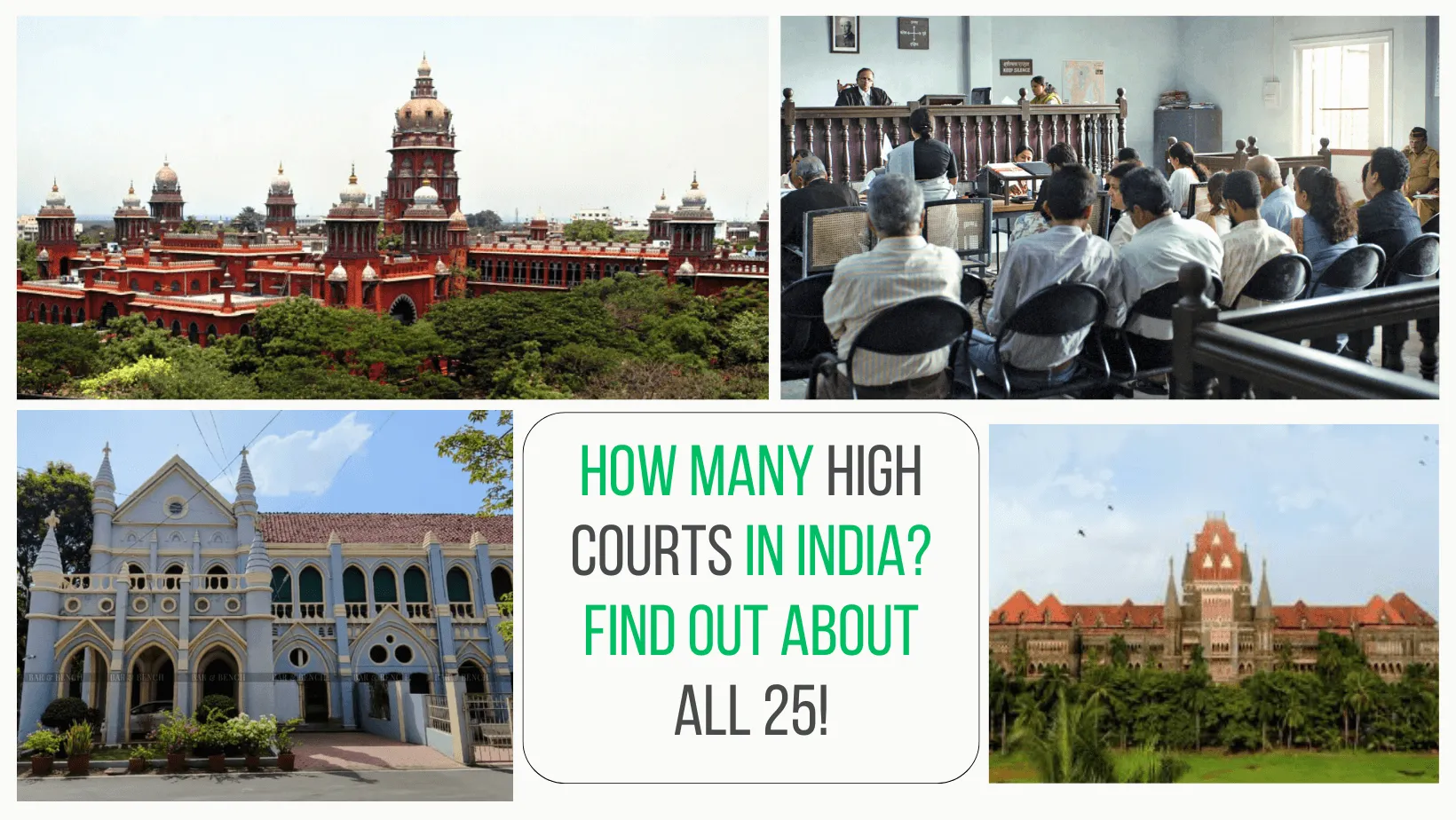Budget Stay Starting @ ₹500 to ₹1000 in Jabalpur
How Many High Courts Are There in India?


India is a democracy with a system of separation of powers, ensuring checks and balances among its three branches: the Executive, Legislature, and Judiciary. In this blog, we will focus on the Judiciary. The Executive enforces laws through a cabinet and a vast bureaucracy that manages public services. The Legislature, or Parliament, is made up of members directly elected by the people, responsible for drafting laws that represent the will of the nation.
The Judiciary, however, remains independent from the other two branches and is responsible for delivering justice, upholding the Constitution, and interpreting laws enacted in India. To understand how many courts are in India, it’s important to know the judiciary follows a three-tier structure. At the bottom are the District Courts, which handle local disputes. Above them are the High Courts in each state, and at the top is the Supreme Court, the highest legal authority in the country. This structure ensures that justice is accessible to all, while maintaining a clear hierarchy for legal appeals and constitutional matters.
Detailed Overview of High Courts in India
India follows a federal structure, where governance is divided between the Central Government and the State Governments. Each state typically has its own High Court, the highest judicial authority in the state with appellate jurisdiction. However, there are exceptions where two or more states share a common High Court.
The High Court not only handles appeals but also oversees the administrative responsibilities of the state’s judiciary, including the appointment and classification of judges in the lower courts. As of today, there are a total of 25 High Courts in India. For example, the Punjab and Haryana states, along with the Union Territory of Chandigarh, share a common High Court located in Chandigarh. Similarly, the Bombay High Court has jurisdiction over Maharashtra, Goa, and the Union Territories of Dadra and Nagar Haveli. The Guwahati High Court oversees the states of Assam, Arunachal Pradesh, Mizoram, and Nagaland.
The 25th High Court in India is the Andhra Pradesh High Court, established in 2019 after the bifurcation of Telangana and Andhra Pradesh.
Below is the list of High Courts with jurisdiction to the states and their principal place of sitting:
| S No | High Court | Jurisdiction to States | Principal Seat | Other Benches |
| 1 | Allahabad High Court[4] | Uttar Pradesh | Prayagraj | Lucknow[A] |
| 2 | Andhra Pradesh High Court[5] | Andhra Pradesh | Amaravati | — |
| 3 | Bombay High Court | Goa, Dadra and Nagar Haveli and Daman and Diu, Maharashtra | Mumbai | Aurangabad,[A] Nagpur,[A] Panaji[A] |
| 4 | Calcutta High Court | Andaman and Nicobar Islands, West Bengal | Kolkata | Port Blair[B] |
| Jalpaiguri[B] | ||||
| 5 | Chhattisgarh High Court | Chhattisgarh | Bilaspur | — |
| 6 | Delhi High Court[6] | Delhi | New Delhi | — |
| 7 | Gauhati High Court[7] | Arunachal Pradesh, Assam, Mizoram, Nagaland | Guwahati | Aizawl,[A] Itanagar,[A] Kohima[A] |
| 8 | Gujarat High Court | Gujarat | Ahmedabad | — |
| 9 | Himachal Pradesh High Court | Himachal Pradesh | Shimla | — |
| 10 | Jammu & Kashmir and Ladakh High Court[8][9] | Jammu and Kashmir, Ladakh | Srinagar/Jammu[C] | — |
| 11 | Jharkhand High Court | Jharkhand | Ranchi | — |
| 12 | Karnataka High Court[10] | Karnataka | Bengaluru | Dharwad,[A] Kalaburagi[A] |
| 13 | Kerala High Court[11] | Kerala, Lakshadweep | Kochi | — |
| 14 | Madhya Pradesh High Court[12] | Madhya Pradesh | Jabalpur | Gwalior,[A] Indore[A] |
| 15 | Madras High Court | Tamil Nadu, Puducherry | Chennai | Madurai[A] |
| 16 | Manipur High Court | Manipur | Imphal | — |
| 17 | Meghalaya High Court | Meghalaya | Shillong | — |
| 18 | Orissa High Court[13] | Odisha | Cuttack | — |
| 19 | Patna High Court | Bihar | Patna | — |
| 20 | Punjab and Haryana High Court[14] | Chandigarh, Haryana, Punjab | Chandigarh | — |
| 21 | Rajasthan High Court | Rajasthan | Jodhpur | Jaipur[A] |
| 22 | Sikkim High Court | Sikkim | Gangtok | — |
| 23 | Telangana High Court[15] | Telangana | Hyderabad | — |
| 24 | Tripura High Court | Tripura | Agartala | — |
| 25 | Uttarakhand High Court[16] | Uttarakhand | Nainital | — |
Exploring the Newest Additions to the High Courts
The newest High Court in India is the Andhra Pradesh High Court, established in 2019 after the bifurcation of the erstwhile state of Andhra Pradesh, which led to the creation of Telangana. Before the reorganization, the High Court was located in Hyderabad and served both states. Following the bifurcation, the court was divided into the Telangana High Court and the Andhra Pradesh High Court.
The Andhra Pradesh High Court now sits in Amaravati, the capital of Andhra Pradesh. This makes it the 25th High Court in India, adding to the existing judicial framework. While all states in India have High Courts, some Union Territories do not have their own, instead sharing jurisdiction with neighboring states. The creation of the Andhra Pradesh High Court was a significant step in ensuring that each state has a dedicated judicial system for efficient legal proceedings.
Role and Function of High Courts in India
The High Court is led by a Chief Justice, appointed by the President of India in consultation with the Chief Justice of India and the collegium, which includes four senior judges. The Chief Justice takes the oath of office administered by the Governor of the state.
The roles and functions of the High Court include:
- Issuing writs under Article 226 of the Indian Constitution to protect the Fundamental Rights of the people.
- Transferring cases from one jurisdiction to another within the state.
- Jurisdiction over judicial and administrative matters, ensuring laws are implemented justly.
- Appellate and review authority over lower court decisions.
- Power to impose capital punishment for heinous crimes.
- Original jurisdiction over election disputes concerning Members of Parliament (MPs) and Members of the Legislative Assembly (MLAs).
Many High Courts also have benches of High Courts in other cities to better serve regional areas. This setup helps ensure the efficiency of the legal system across the country. Understanding how many High Courts are in India at present and their structure is essential for anyone engaging with the Indian judiciary.
Conclusion
So, there are currently 25 functioning High Courts in India, each playing a significant role in the judicial framework of the country. These courts wield substantial influence, as their rulings often form judicial precedents that guide future cases of a similar nature. Jabalpur, known as the Judicial City of Madhya Pradesh, is home to one of these High Courts. With numerous litigants visiting the city regularly for court matters, finding affordable accommodation is essential, especially for extended stays.
If you are planning to visit Jabalpur for legal proceedings or to meet your lawyer, you can consider staying at a hotel in Jabalpur under ₹500. One excellent option is Hotel Anand, which offers comfortable accommodations at budget-friendly rates under ₹800. The hotel provides double bedrooms with attached bathrooms, ensuring convenience and privacy. Additionally, it offers a 24-hour check-out policy, giving you flexibility in managing your stay. Book your hotel in Jabalpur under 500 to enjoy a relaxing, affordable stay while you focus on your legal matters.



